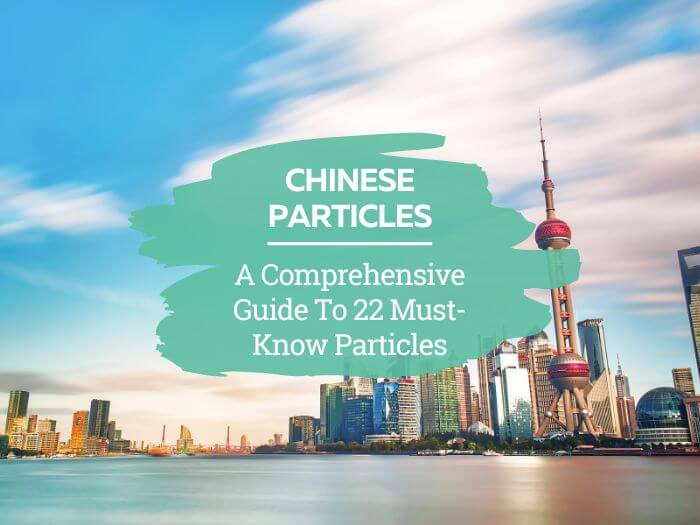If you're learning Chinese, you should know that to make even basic sentences, you need to use words called particles.
Other types of Chinese particles will allow you to add whole extra layers of nuance and feeling to the things you say.
Indeed, Chinese particles are a fundamental aspect of the language. So to help you get started, here’s my comprehensive introduction to this important and useful topic.
By the end of this post, you'll be able to use 22 different particles to express yourself with more ease.
Pro Tip
By the way, if you want to learn Chinese fast and have fun, my top recommendation is Chinese Uncovered which teaches you through StoryLearning®.
With Chinese Uncovered you’ll use my unique StoryLearning® method to learn Chinese through story…not rules. It’s as fun as it is effective. If you’re ready to get started, click here for a 7-day FREE trial.
Table of Contents
What Are Chinese Particles?

As always, let’s start at the beginning – what are Chinese particles?
Particles are an aspect of Chinese – and several other East and Southeast Asian languages like Japanese and Thai – that doesn’t exist in English.
In Chinese, they are single-syllable, single-character words that are added to sentences to change the meaning or nuance of the sentence without having any lexical meaning of their own.
Grammarians have lots of technical and sometimes complicated ways to categorise these words. But to simplify things, I like to divide them into two groups – plus an extra one.
These are not groupings you’re likely to find in grammar books – and there can sometimes be a degree of overlap – but it can be a useful way for beginners to think about things.
“Grammar” Particles
The first group is what I call “grammar” particles. These are Chinese particles that are grammatically necessary for a sentence. And not using the correct particle would change the meaning of the sentence or make it incorrect.
“Feeling” Particles
Then there are what I think of as “feeling” or “mood” particles. These are particles, usually added to the end of a sentence, that change the feel of what is being said without changing the basic meaning.
With these particles, if you don’t use one, the meaning of the sentence remains the same, but the nuance of what the speaker might be implying will be lost.
In a way, these can be thought of as the emoticons of Chinese that help the listener understand more about what the speaker is saying beyond the mere words they use.
Exclamations
There is also a third class of particles used for exclamations. These are not grammatical words at all and are essentially Chinese onomatopoeia, the equivalent of things like “huh?” or “eh?” in English.
The focus of this post is the first two types of particles – but I’ll include some of these exclamation particles at the end too because they’re useful as well as fun to know!
So let’s jump in and get started.
“Grammar” Particles

Let’s start with “grammar” particles. Remember, these Chinese particles are essential for the meaning of the sentence, so without them, the sentence would not have the same meaning. Often, not using them would also make the sentence incorrect.
1. 吗 ma – Chinese Question Particle
One of the first particles you’ll learn in Chinese is 吗 ma. It is placed at the end of a sentence to turn a statement into a question. And as you’ll notice, it’s pronounced with a neutral tone.
Here are some examples:
- 他是李先生 tā shì lĭ xiānsheng (He is Mr Li) [statement]
- 他是李先生吗? tā shì lĭ xiānsheng ma? (Is he Mr Li?) [question]
- 你想来我家吃饭吗? nĭ xiăng lái wŏ jiā chī fàn ma? (Would you like to come to my house to eat?)
2, 3 &4. 的 de 得 de And 地 de
Next, we come to three very important grammar particles, 的, 得 and 地.
All three of these particles are pronounced the same way – a toneless de. However, they are used in different ways, so let’s look at each of them in turn.
的 is one of the most common particles in Chinese, and it has several different uses – so let’s start by looking at these. After that, we can move on to talking about how 得 and 地 are different.

的 Used To Link Two Elements In A Sentence
One of the most important uses of 的 is to link two elements in a sentence, with the first element giving you some kind of extra information about the second.
Look at this sentence:
- 房子的门 fángzi de mén (The door of the house/the house’s door)
Here, the focus is 门 mén (door), and 的is used to connect to the extra information about the door – in this example, specifically, which door.
As you can see from the translation, in English we express this as “the door of the house” or “the house’s door”, both of which are possessive forms.
For this reason, many people tend to think of 的 as the particle used for forming possessives. However, this is misleading since it doesn’t work in every case.
For example, look at these two examples:
- 去重庆的人 qù chóngqìng de rén (People who go/are going to Chongqing)
- 奇怪的想法 qíguài de xiăngfă (A strange way of thinking)
In the first example, the sentence is about 人 rén (people), and the extra information is 去重庆 qù chóngqìng.
The literal translation of this would be “go Chongqing [de] people”, but in English, that makes little sense – we would more naturally say “people who go/are going to Chongqing”.
But in any case, there is no sense of possession here.
In the second example, the main word is 想法 xiăngfă, which means something like “way of thinking”, and the word that tells you more about it is 奇怪 qíguài, the adjective meaning “strange”.
If the modifying word is an adjective, the word order is the same as in English – you just need to add 的 between the adjective and what it’s describing.
However, if the adjective is a one-character word, you don’t need 的:
- 黑猫 hēi māo (Black cat)
- 高山 gāo shān (Tall/high mountain)
On the other hand, if the adjective is modified by an adverb, you need to put the 的 back in:
- 很黑的猫 hĕn hēi de māo (Very black cat)
- 最高的山 zuì gāo de shān (The tallest/highest mountain)

的 As A Nominaliser
Following on from this, 的 can also be used with adjectives as a so-called “nominaliser”, which means it stands in for a noun in sentences when the noun is understood but not stated.
In English, this is done by saying things like “the big one” or “the red one”, and here’s how you do it in Chinese:
- 那个红色的杯子 nèi ge hóngsè de bēizi (That red cup)
- 那个红色的 nèi ge hóngsè de (That red one)
- 那本很重的书 nèi bĕn hĕn zhòng de shū (That very heavy book)
- 那本很重的 nèi bĕn hĕn zhòng de (That very heavy one)
In the first version of both of these sentences, the noun is stated, but in the second version, the noun is understood. So 的 is allowed to stand in for it, and you don’t need to say it.

的 With Personal Pronouns
的 can also be used with Chinese pronouns to express possession.
The logic of this is the same as above – 的is still being used to link two elements in a sentence to give you extra information about the thing you’re talking about.
However, in this case, the extra information is who the thing belongs to. So here, it can be simpler for learners just to think of 我的 wŏ de, 你的 nĭ de etc. as being the equivalent of English possessive forms like “my”, “your” etc.
- 我的书 wŏ de shū (My book)
- 我们的朋友 wŏmen de péngyou (Our friend)
When the noun isn’t stated and 的 is allowed to stand for it, the translation becomes “mine”, “yours” etc., like this:
- 这本书是谁的?是我的 zhè bĕn shū shì shéi de? shì wŏ de (Whose is this book? It’s mine)
- 他是谁的朋友?她的 tā shì shéi de péngyou? ta de (Whose friend is he? Hers)
Note that when 谁 shéi (who) is combined with 的 like this, it becomes the equivalent of “whose”.
One exception to using 的 to indicate possession is when you are referring to close friends or family members – in these cases, 的 is not necessary:
- 我爸爸 wŏ bàba (My dad)
- 我家 wŏ jiā (My home) [in Chinese, 家 jiā implies your house and your family, not just the physical building]
Similarly, in sentences that require 的 several times, it’s normal to drop some of them to avoid clunky-sounding repetition, like this:
- 我老是的车 wŏ lăoshī de chē (My teacher’s car)
(not 我的老师的车 wŏ de lăoshī de chē)

得 de
得 is used differently from 的 – but in spoken Chinese, the pronunciation is identical. However, it’s important to understand its usage so you can choose the correct character when writing or typing in Chinese.
The first use of 得 is to express the manner in which something is done, for example:
- 他吃得真快 tā chī de zhēn kuài (He eats really quickly)
- 她打鼾打得很大声 tā dă hān dă de hĕn dàshēng (She snores very loudly)
You will also come across this 得 in expressions known as complements of potential, like this:
- 听得懂 tīng de dŏng (can understand) [when listening]
- 看得懂 kàn de dŏng (can understand) [when reading]
- 吃得完 chī de wán (can eat all up)
- 来得及 lái de jí (there’s still time)
There’s more to say about these types of expressions, but I don’t have space to go into it further here. But at least you should remember that the correct character to use in these expressions is 得.

地 de
This de is different again and is used to form adverbs from adjectives to express the manner in which something is done.
For example:
- 他很慢地走路 tā hĕn màn de zŏu lù (He walks very slowly)
- 我很开心地读书 wŏ hĕn kāixīn de dú shū (I study very happily)
In sentences such as these, the adjective is placed before the verb and is followed by 地, which changes the adjective into an adverb.
The structure of these sentences is different from ones that use 得, although the meaning can be the same.
For example, compare these two sentences:
- 他很慢地走 tā hĕn màn de zŏu (He walks very slowly)
- 他走得很慢 tā zŏu de hĕn màn (He walks very slowly)
These two sentences are very similar and express similar ideas. However, there is a slight difference in usage.
The first, with 得, is used to express the idea that somebody generally tends to walk slowly – while the second, with 地, is more commonly used to express the idea of somebody walking slowly on one specific occasion.

5. 在 zài
在 zài is much simpler to understand. It’s used as the Chinese equivalent of -ing in English for continuous actions, like this:
- 你在做什么?我在看电视 nĭ zài zuò shénme? wŏ zài kàn diànshì (What are you doing? I’m watching television)
However, in Chinese, you only need to use 在 zài when you want to emphasise the continuous nature of the action, but the sentence can be translated in the same way without it:
- 你做什么?我看电视 nĭ zuò shénme? wŏ kàn diànshì (What are you doing? I’m watching television)
6. 过 guo
This is another easy particle to understand. It’s used to express the idea that you have already done something in the past – when used in a question, it’s the equivalent of asking “have you ever…?” in English.
- 你去过中国吗?我还没去过 nĭ qù guo zhōngguó ma? wŏ hái méi qù guo (Have you ever been to China?/Have you been to China before? I haven’t been there yet)
7. 着 zhe
着 zhe is used to express a constant or continuous state. However, it shouldn’t be confused with 在 zài, which is used to express a continuous action:
- 他站着地听音乐 tā zhàn zhe de tīng yīnyuè (He listens/is listening to music standing up)
Here, “standing up” is considered a continuous state, so this is expressed as 站着 zhàn zhe.
Here’s another example:
- 黑板上写着 hēibăn shàng xiĕ zhe (It’s written on the blackboard)
The writing is on the blackboard and isn’t going anywhere, so this is expressed as 写着 xiĕ zhe.

8. 了 le
The innocuous-looking particle 了 le is one of the most complicated aspects of Chinese grammar, and many chapters in countless grammar books have been dedicated to it.
As a result, I won’t go into the details here other than to give two very basic examples of how it’s used.
了 le can be used to express the idea that an action has been completed, for example:
- 我买了两包烟 wŏ măi le liăng bāo yān (I bought two packets of cigarettes)
A common mistake for beginners is to see 了 le as the particle used to express the past tense, but this is not the case. For example, in a negative sentence, there is no sense of an action being completed, so you can’t use 了 le:
- 我没买两包烟 wŏ méi măi liăng bāo yān (I didn’t buy two packets of cigarettes)
The second major use of 了 le is to express some kind of new situation, like this:
- 现在八点了 xiànzài bā diăn le (Now it’s 8 o’clock)
- 他来了 tā lái le (He’s here) [lit. “he come [le]”]
When used in negative sentences, this 了le expresses the idea of “no longer” or “not anymore”:
- 你不年轻了 nĭ bù niánqīng le (You’re not young anymore)
“Feeling” Particles

“Feeling” particles are the ones that can be added to the end of sentences to change the feel of what is being said without changing the basic meaning.
In English, we can do something similar with intonation, but since Chinese is a tonal language, there’s much less scope for this. So this is where these Chinese particles come in (although even with Chinese tones, it’s still possible to use intonation too!).
If you don’t use them, you will still be understood, but learning how to use them correctly will allow you to convey much more nuance in what you say.
Plus, it will make your Chinese sound much more natural and native-like. So learning how to use them properly is a sure way to impress any native speakers you talk to!
Notice, too, that all of the examples of “feeling” particles (and 吗 ma above) include the “mouth” radical (口) in the character – so spotting this radical in a character gives you a clue that you might be looking at a particle.
Here are some of the most common.
9. 呢 ne

The particle 呢 ne is toneless, and it has several uses.
When asking a question, using 呢 can add a certain amount of insistence to the question:
- 我没有车。 那咱们怎么去呢?! wŏ méi yŏu chē. nà zánmen zĕnme qù ne?! (I don’t have a car. Then how will we go/get there?!)
It can also be used to soften a question or make it feel less direct, like this:
- 你今天晚上想吃什么菜呢? nĭ jīntiān wănshàng xiăng chī shénme cài ne? (What dishes/food would you like to eat this evening?)
In this sentence, the difference is subtle – it’s a bit like the difference between using “would like to” instead of “want to” in English, with the latter form feeling more direct and abrupt.
It can also be used to soften other sentences:
- 我们的产品里有那个吗? 没有, 禁用呢
- wŏmen de chănpĭn lĭ yŏu nà ge ma? méi yŏu, jìnyòng ne
- Does our product have that in it? No, it’s forbidden/banned
- wŏmen de chănpĭn lĭ yŏu nà ge ma? méi yŏu, jìnyòng ne
Here, we can imagine a boss asking a subordinate about the product. Perhaps the answer is something the boss should already know, so the subordinate adds a 呢 ne to the answer to soften it. This way, the boss doesn’t lose face or feel stupid.
When 呢 ne is used with 还没有 hái méi yŏu (still have not), it expresses the idea that you still hope something will happen or that there is a possibility it will happen:
- 你去过中国吗?还没有呢 nĭ qù guo zhōngguó ma? hái méi yŏu ne (Not yet) [the implication is that the speaker hasn’t been to China yet but still hopes or plans to go one day]
Finally, 呢 ne can also be used as the equivalent of things like “and you?” or “what about you?” in English, like this:
- 你好吗? 我很好,你呢? nĭ hăo ma? wŏ hĕn hăo, nĭ ne? (How are you? I’m very well, and you?)
- 我想去,你呢? wŏ xiăng qù, nĭ ne? (I want to go, what about you?)
- 那条裤子多少钱?300块。然后外套呢?
- nà tiáo kùzi duōshăo qián? 300 kuài. ránhou wàitào ne?
- How much are those trousers? 300RMB. What about the coat?
- nà tiáo kùzi duōshăo qián? 300 kuài. ránhou wàitào ne?

10. 吧 ba
I’ve placed 吧 ba in the category of “feeling” particles, but there is a certain amount of overlap with “grammar” particles.
吧 is often used to add a sense of insistence to a sentence, making it into an enthusiastic suggestion or a mild command, a bit like a kind of imperative.
For example:
- 走吧! zŏu ba! (Let’s go!)
- 给我三个吧! gĕi wŏ sān ge ba! (Give me three!)
- 那就明天见吧! nà jiù míngtiān jiàn ba! (In that case, see you tomorrow!)
It can also be used to express consent or approval:
- 我要用筷子吗? 好吧! wŏ yào yòng kuàizi ma? hăo ba! (Do I have to use chopsticks? Ok!)
吧 ba is also often used to express some kind of doubt in the speaker‘s mind:
- 今天会下雨吗?应该会下雨吧 jīntiān huì xià yŭ ma? yīnggāi huì xià yŭ ba (Is it going to rain today? I guess it’s going to rain)
- 我不知道,给我那个红色的吧 wŏ bù zhīdào, gĕi wŏ nèi ge hóngsè de ba (I don’t know, give me the red one)
With this sentence, we can imagine somebody is in a clothes shop and doesn’t know which colour to choose. So they make a spontaneous decision and go for the “red one”.
However, in another context where the person knows exactly what they want, the 吧 ba could have the effect of changing the sentence into a mild order to the shop assistant. This is a good example of the nuances and subtleties of Chinese particles!
Finally, 吧 ba can also be used to ask leading questions.
- 这是你的吧? zhè shì nĭ de ba? (This is yours, right?)
(Compare with 这是你的吗?zhè shì nĭ de ma? – Is this yours?)
- 你没事吧? nĭ méi shì ba? (Are you ok? You’re ok, right?)
(Compare with 你有事吗?nĭ yŏu shì ma? – in this version, the person doesn’t know if the other person is ok, but in the version with 吧 ba, the person thinks – or at least hopes – that the person is ok.)

11. 啊 ā 呀 yā
啊 is a particle used at the end of a sentence to add extra enthusiasm or excitement to what is being said:
- 咱们去吃火锅吧。好啊! zánmen qù chī huŏguō ba. hăo ā! (Let’s go and have hotpot. Ok, great!)
When the final sound of the sentence is a, e, i, o or ü, 啊 ā becomes 呀 yā – although the meaning remains the same.
12. 嘛 ma
嘛 ma is added to the end of a statement to imply that what is being said should be obvious.
For example:
- 你怎么知道呢? 他告诉我嘛! nĭ zĕnme zhīdào ne? tā gàosu wŏ ma!
Here, without the 嘛 ma, the answer is neutral, but with嘛 ma, the implication is more like “because he told me – how else do you think I know?”.
The context and the tone of voice will tell you whether the particle being used is 吗 or 嘛 since both are pronounced as a toneless ma.
13. 呗 bei

呗 bei is similar to 嘛 ma in that it’s used to imply that an answer is obvious. However, it gives the sentence an added hint of sarcasm, showing that the speaker thinks the question was a bit stupid:
- 你为什么要去商店? 买东西呗! nĭ wèishénme yào qù shāngdiàn? măi dōngxī bei! (Why are you going to the shop? To buy stuff!)
Chinese particles like this in particular will impress your Chinese friends if you can learn how to use them correctly. But be a bit careful too, because using this in the wrong context with the wrong person could also cause offence.
Compare with an example we saw earlier:
- 我们的产品里有那个吗?没有, 禁用呗
- wŏmen de chănpĭn lĭ yŏu nà ge ma? méi yŏu, jìnyòng bei
- Does our product have that in it? No, it’s forbidden/banned
- wŏmen de chănpĭn lĭ yŏu nà ge ma? méi yŏu, jìnyòng bei
In this sentence, by replacing the 呢 ne with 呗 bei, it makes the sentence seem sarcastic, as if the subordinate is implying the boss is stupid.
If the subordinate has a friendly relationship with their boss, this could be taken as banter. But in other circumstances, the boss might easily take offence, so this is a good example of how powerful such Chinese particles can be.
“Exclamation Particles” And Onomatopoeia

Finally, here is a selection of Chinese exclamation particles and onomatopoeia. These are even more useful than ever nowadays since so much communication takes place via text – on apps like 微信 wēixìn (WeChat) and sites like 微博 wēibó (Weibo).
Since these sounds are used to express emotions and exclamations, the tone rules are less strict, depending on the context.
And once again notice the “mouth” radical in all these particles.
14. 哈 ha (usually hā)
哈哈哈 hāhāhā is the Chinese way to write hahaha.
15. 哇 wā
This character is used to express surprise or amazement. It’s the equivalent of saying “wow”.
16. 啊 a (Various Tones)
As we saw, 啊 can be used as a sentence-final particle to express enthusiasm. However, it can also be used alone to express surprise, dismay and much more, depending on the situation and the tone.
For example, with a rising tone, it might express surprise, the same as saying “huh?” or “what?” with a rising intonation in English.
On the other hand, with a falling tone, it might express sudden realisation or perhaps disappointment.

17. 哦 o (Various Tones)
An easy one to remember, this is the equivalent of the English “oh!”.
18. 嗯 èn, ng
This is the same as “mm” in English. It can be used to mean “yes” or “uh-huh”, and it is also the noise you make while somebody is talking to you just to show you are listening!
19. 唉 āi
This is the noise of disappointment. It can also be pronounced with a falling tone.
20. 哼 hng
This is the Chinese character and sound for “hmph!”.
21. 嗨 hai
Pronounced with a high or falling tone, this is how to write the loanword “hi” in Chinese and can be used as a more informal Chinese greeting to say 你好 nĭ hăo (hello), especially online.
22. 啦 lā
This is the Chinese onomatopoeia for singing.
Chinese Particles FAQ
Do Chinese have particles like Japanese?
Yes, Chinese has particles similar to Japanese. These particles often appear at the end of sentences to convey tone, emphasis, or mood, such as 啊 (a) or 呢 (ne), or within sentences to mark aspects or actions, such as 了 (le) or 过 (guò).
What are modal particles in Chinese?
Modal particles in Chinese are words added to the end of sentences to express mood, attitude, or emphasis. Examples include 吧 (ba) for making suggestions, 呢 (ne) for softening questions, and 啊 (a) for adding emotion or tone.
What are the aspect particles in Chinese?
Aspect particles in Chinese show the state or progression of an action. Common examples are 了 (le) for completed actions, 着 (zhe) for ongoing actions, and 过 (guò) to indicate past experiences.
What are the negative particles in Chinese?
Negative particles are used to negate statements in Chinese. The most common are 不 (bù) for general negation in the present or future, and 没 (méi) or 没有 (méiyǒu) for negating past actions or the absence of something.
Chinese Particles: An Incredibly Important Aspect Of The Language

Chinese relies heavily on particles, both for constructing grammatically correct Chinese sentences and for adding nuance, feeling and mood to what you want to express.
What I’ve called “grammar” particles are essential since without them, you can’t make correct sentences, so they’re something you’ll have to master early on.
However, “feeling” particles, although not technically essential, can add so much more depth to what you say.
And getting to grips with them and using them correctly will help take your Chinese to the next level while impressing any native speakers you talk to.
To see these Chinese particles in action, make sure you follow the rules of StoryLearning and read in Chinese. As you read books in Chinese, you'll see the particles over and over again and they'll soon become second nature.

Olly Richards
Creator of the StoryLearning® Method
Olly Richards is a renowned polyglot and language learning expert with over 15 years of experience teaching millions through his innovative StoryLearning® method. He is the creator of StoryLearning, one of the world's largest language learning blogs with 500,000+ monthly readers.
Olly has authored 30+ language learning books and courses, including the bestselling "Short Stories" series published by Teach Yourself.
When not developing new teaching methods, Richards practices what he preaches—he speaks 8 languages fluently and continues learning new ones through his own methodology.










































